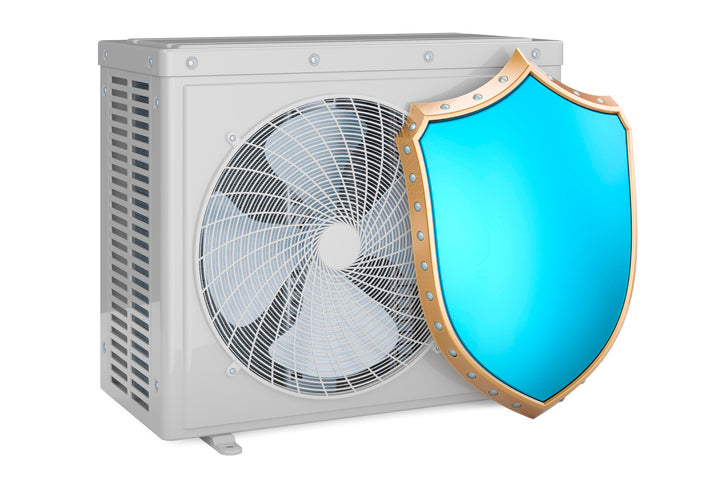What Causes Your AC To Smell and How To Fix It

Thank goodness for air conditioning in the hot summer months. When you keep up with regular maintenance, you can enjoy your AC unit for years to come. Still, sometimes things happen beyond our control, or we get a bit behind on maintenance—and suddenly the air conditioner is no longer a joy to have running as it suddenly releases unusual odors into your home. Understanding what causes your AC to smell and how to fix it is the first step in getting rid of odd AC odors. Let’s look at the common causes and solutions.
Mold and Bacteria
Unfortunately, air conditioners are a breeding ground for mold and bacteria. Air conditioners remove moisture from the air, and all of that moisture passes through the AC unit. If it gets trapped, mold and bacteria have a great time multiplying.
The first sign of mold and bacteria is the smell of mildew in the house, which comes through the vents. It’s usually prominent when the AC turns on, so most people quickly notice where it’s coming from. So, what can you do about mold and bacteria in your air conditioner? We suggest you call your HVAC technician so they can properly clean all the filters and surrounding areas, which cleans the unit and rids it of any mold or bacteria.
Poor Drainage
As condensation builds from all of the moisture trapped in an air conditioner, it needs to drain properly. If it doesn’t, you may notice an odor akin to smelly feet or socks. The odor is often caused by standing water that isn’t draining. The drainpipe is most likely not draining as it should, so the solution is simply to clean it.
Fluid Leaks
Many air conditioners use fluids to cool the house. If you smell an odor similar to exhaust fumes, don’t panic. Your AC isn’t using gas to run so that’s not what you’re smelling. You may be smelling some of the air conditioner’s fluids, which means they’re leaking from somewhere. If so, call your HVAC repair technician to fix the situation.
Motor Burnout
If the fan or compressor begins to have problems, you may smell a burning odor. This isn’t something to ignore, so shut down the system and call your repair technician right away. Don’t confuse this smell with the warm or burning smell when the heat is first turned on in the winter. That smell is simply from dust accumulation burning off, and it’s normal.
Dead Animals
Sadly, small animals often make their way into AC units and HVAC systems. You’ll know when an animal has died in your system because as time goes on the odor becomes unbearable. The dead critter must be removed, of course, and the unit thoroughly cleaned.
Ductwork
In systems that require ductwork, the ductwork must be clean for everything to run efficiently. Bad odors are one of the side effects of unclean ductwork, ductwork that has a crack or hole in it, or ductwork that’s holding moisture. Have the ducts cleaned regularly and replace them when necessary or when you’re switching to a ductless system.
Prevent Bad Odors
Now we know a few of the common reasons for bad odors in the AC, but what can you do to prevent it? Well, sometimes it’s unavoidable and out of anyone’s control, like when a small critter dies inside of it. However, you can do some things to prevent other bad odor issues in your air conditioner. Read about them below.
Perform Maintenance
Regular maintenance for an air conditioning unit or an entire HVAC system requires a professional check-up twice a year (once in the spring for AC and again in the fall) so it can run well and doesn’t stop when you need it most. With regular cleaning and system checks, your AC won’t fail you during the hot days of summer.
In between visits, ask your HVAC professional how often you should change the filter. Filters are great for collecting dirt, dust, and debris, but it all starts traveling through your system if the filter isn’t kept clean.
Replace Outdated Systems
If your HVAC system is getting too old, then it can’t be avoided—it’s time for a new system. It’s understandable to want to put it off. After all, who wants to spend money on something like a new air conditioner? However, in the long run, money is saved when energy bills are lowered, thanks to a newer system that runs more efficiently than an old one.
Is Ductwork for You?
Many homes are built with traditional ductwork HVAC systems. As additions are added or homes are downsized and some rooms don’t get used anymore, a ductwork system isn’t always the best choice— especially if it’s older, has plenty of upkeep costs, and isn’t running efficiently.
An option other than ductwork is a ductless mini-split, which contains an indoor unit and an outdoor unit that’s connected with tubing and wiring. Ductless systems run efficiently, are cost-effective, require less maintenance, have no ductwork, and are used to cool one room or as many as you need. A bonus of ductless systems is the ability to specifically control temperatures in separate rooms.
Now that we have a clear picture of what causes your AC to smell and how to fix it, you can rest assured that you’ll know what’s causing the strange odors coming from your air conditioner. When it’s time for a new system, The Pioneer Mini-Split Store offers efficient ductless systems, including the floor mini-split and wall mount systems. Contact us with all of your HVAC questions and needs and we’ll let you know if a ductless system sounds right for you. Until then, stay cool and enjoy the lazy days of summer.







